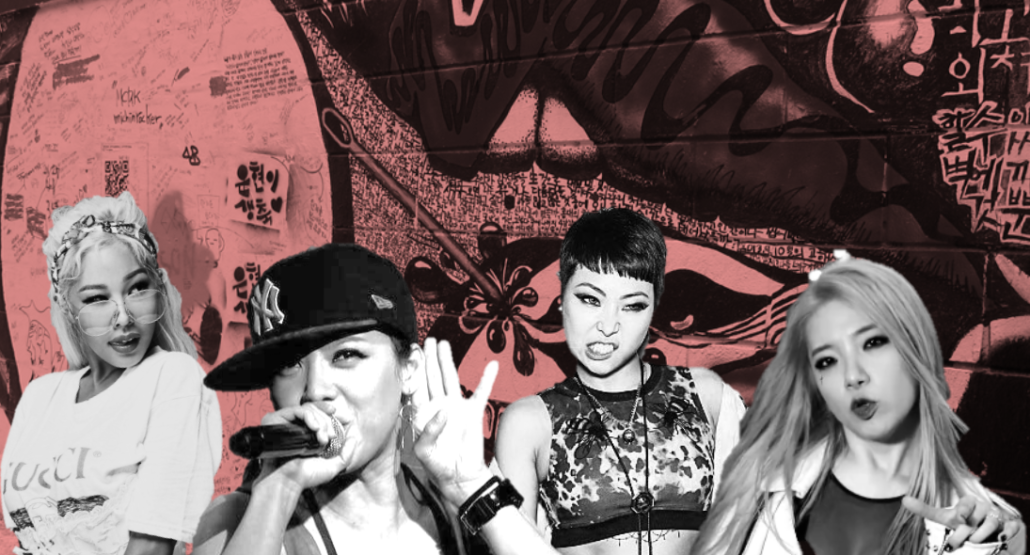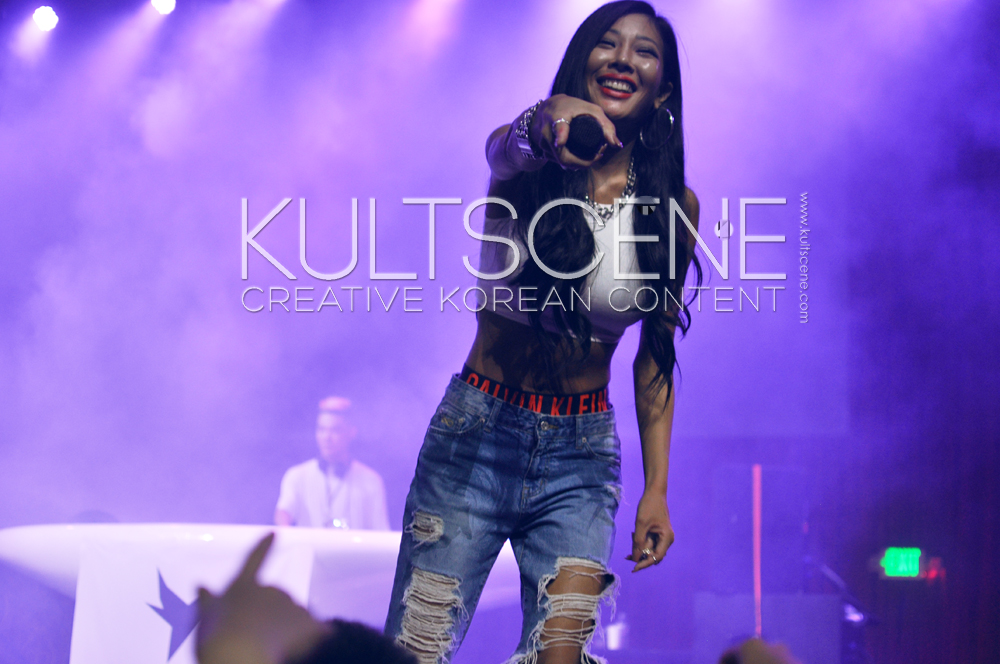Ego tripping, & not, in Korean female rap
In rap music, ego tripping is the attitude of an individual who brags about themselves in a display of confidence and high self-esteem. Despite not being a necessity for rap lyrics, the confident swagger of ego tripping is definitely a part of hip-hop culture. When it comes to Korean hip-hop, it’s not uncommon to see men rapping about how amazing, rich, and successful they are but, when it comes to the ladies, ego tripping is not as well received in K-hip-hop.
Probably the most relevant female names in Korean rap right now, Jessi and Heize, illustrate very well how Korea feels about female rappers. They both rap, sing, write songs, and have been contestants on the female rap competition show Unpretty Rapstar. However, their styles are very different, and it’s this difference that may explain why Koreans prefer Heize’s music over Jessi’s.
While Heize’s music has more R&B elements and her delivery is a softer rap style with sentimental lyrics that stays away from the more abrasive side of hip-hop, Jessi’s music varies between melancholic ballads and hard-hitting rap anthems. It is on those raps, though, that Jessi showcases the figure that made her become a reference of a “tough unnie” (or ssen unnie in Korean, like her single by the same name), a confident and intimidating female with strong opinions, who raps unapologetically about her skills, looks, and overall awesomeness.
Also on KultScene: This is NOT a competition, Jessi slayed her Los Angeles show
Jessi’s outspoken behavior on the first season of Unpretty Rapstar in 2015 gave her huge success among the global K-hip hop audience. But all of this popularity hasn’t translated into sales for Jessi, at least not in Korea. Her latest mini album, Un2verse, was released in mid-July, and ranked number four on the Billboard World Albums chart a month later, but only reached number 64 on the Gaon Album Charts, the chart of the best-selling albums in Korea.
On the other hand, while we’re writing this in late-August, Heize’s latest mini album /// (너 먹구름 비) is at number 47 on Gaon, even though it’s been almost two months since it was released. Her current single off the album, “You, Clouds, Rain” featuring Shin Yong Jae, is charting at number three at the moment on Gaon. The first single from the album, “Star”, achieved an all kill (a number one position on all of the most relevant Korean charts); this is something that has never happened to any Korean female rapper before. Ever!
Another female hip-hop artist worth mentioning is Yoonmirae (also known as Tasha of MFBTY), the Queen of Hip Hop in Korea, who is kind of an exception. Like Heize, she has reached number one on the charts, —but only with pop ballad songs released as OST for TV dramas, similarly to how Heize’s only peaked with less softer tunes; proving that even though hip-hop itself is a vehicle for empowerment, displays of boasting and self-confidence from Korean female rappers are not as well received as songs that focus on vulnerability and romantic relationships.
Yoonmirae, for example, has paved her way as the most relevant Korean female rapper mostly due to songs in which she raps about her personal struggles as a biracial person in Korea. She became an icon of resistance, representation, empowerment, and freedom for women and multiracial people. Even though she’s also an amazing singer with a delicate voice, it’s her rapping what made her the legend she is, though none of those rap tracks topped charts. Yoon is a strong, fierce woman; she has a bass in her voice when she raps, she curses, she does ego tripping all the time, and she has absolutely no fear or shame to sound cocky.
However, even with all these features and history, Mirae’s most famous solo rap tracks are “Memories” and “Black Happiness,” which, in spite of having straightforward and sensitive lyrics, are ballads. Meanwhile, songs like “Pay Day” or the tracks she released with MFBTY, her hip-hop group with her husband Tiger JK and Bizzy, in which she shows more confidence and brags about her power and confidence, sometimes even confessedly ego tripping (“Oh yes I’m ego trippin’ / Middle finger I’m flippin’ / Oh yes I’m chain heavy / So much ice, look how I’m drippin’”), are never as successful as her softer songs.
Other female rappers who have similarly released ego-trip tracks have also seen minimal success: In “Gucci,” Jessi boasts about driving her own car, being “self-made,” speaking “nothing but the truth,” and having a “gangsta attitude.” In “Cinderella,” Tymee, another Unpretty Rapstar contestant, calls herself “hip-hop god mama” and “rap queen.” In “My Number,” Cheetah, who won the first season of Unpretty Rapstar brags about how being “a TV show champion” made her “a rap star, a celeb, and part of the fashion people.
What do all of these songs have in common? They were released by bold spirited women who are greatly talented and with considerable notoriety in Korea. Everyone knows who Jessi, Tymee, and Cheetah are. They’ve all been prominent figures on Unpretty Rapstar, and they have thousands of followers on social media. But did their singles sell as well as Heize’s? No.
And that’s not due to their lack of skills. Cheetah and Jessi were, respectively, the winner and runner up on season one of Unpretty Rapstar and are largely respected as rappers, being called on to participate as guests on rap competitions or features in songs of male rappers quite often. Tymee has one of the most long-lived careers as a female rapper in Korea, being respected as an underground rapper way before turning into E.via, who was sometimes mocked by her controversial concepts, but still praised for her rap skills after switching over to her Tymee name.
Heize, for her part, is a talented and well known rapper too. She was even on Unpretty Rapstar as well. So, basically, what distinguishes her from the ladies we mentioned above is the fact that her style is way more focused on her own fragility and emotions towards sensitive aspects of life and love.
It certainly is not due to the lack of sonic appeal of each woman’s songs either, since all the previously mentioned tracks follow the same hip-hop trends we’ve been hearing in male rappers’ songs on the music charts. It may just be that South Korea isn’t ready for a chart-topping abrasive female, opting for the more sentimental side of these hip-hop artists.
Also on KultScene: ‘Unpretty Rapstar,’ crooked or boost to female Korean rappers?
We’re not going for any girl-hate here, but why is Heize’s music easier to consume than music released by women who have no pudency and are not ashamed of taking pride for their qualities and achievements? Are people not comfortable with women ego tripping?
And this is not an isolated trend to Korean hip hop. We can see this mirrored in K-pop as well, where the resurgence of cute K-pop girl groups have pretty much annihilated the ones with a stronger and empowering concept. (But that’s a story for another time…) It’s simply important to note that this is not something that exists in a vacuum.
So why is this happening? It may or may not have something to do with personal taste in South Korea, where coffee house music reigns, or maybe even with cultural factors. As foreign fans, it’s easy for us to point out the sexism and patriarchal values that explain why a man is most likely to achieve success and respect for bragging about himself than a woman is. But it also may be disrespectful, and imprudent, to single out Korean culture since we’re not Koreans.
The fact that Heize stands between Korean rap’s hottest names is indeed something to be celebrated, but the ideal scenario would be to have other female rappers join her. The problem is not a lack of talented female MCs, so why not?
The female rappers we previously addressed are nothing but a few examples of women who are just as deserving as Heize or any other male rapper that is on the charts right now. If Jessi, Tymee, Cheetah, or Yoon Mirae were men, or if they had stuck to a ballad-ish emotional concept, they would certainly sell better in Korea. It’s unfortunate they haven’t been able to reach the success Heize has at the moment by being themselves. And while Heize’s success is well deserved, the larger theme is that some people are still intimidated by strong, empowered females. But, whatever the reasons for their confidence and ego trips be a limiting factor for success, it’s undeniable that persisting on their truth and sticking to their personal preferences regardless of how they’re seen is an act of resistance from these ladies —and that alone is something worth of great respect.
What are your thoughts on female rappers that ego trip? Let us know your picks and thoughts in the comment section below. Be sure to subscribe to the site and follow us on Facebook, Twitter, Instagram, and Tumblr to keep up with all of our posts.



